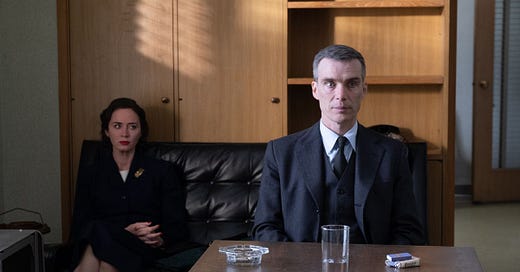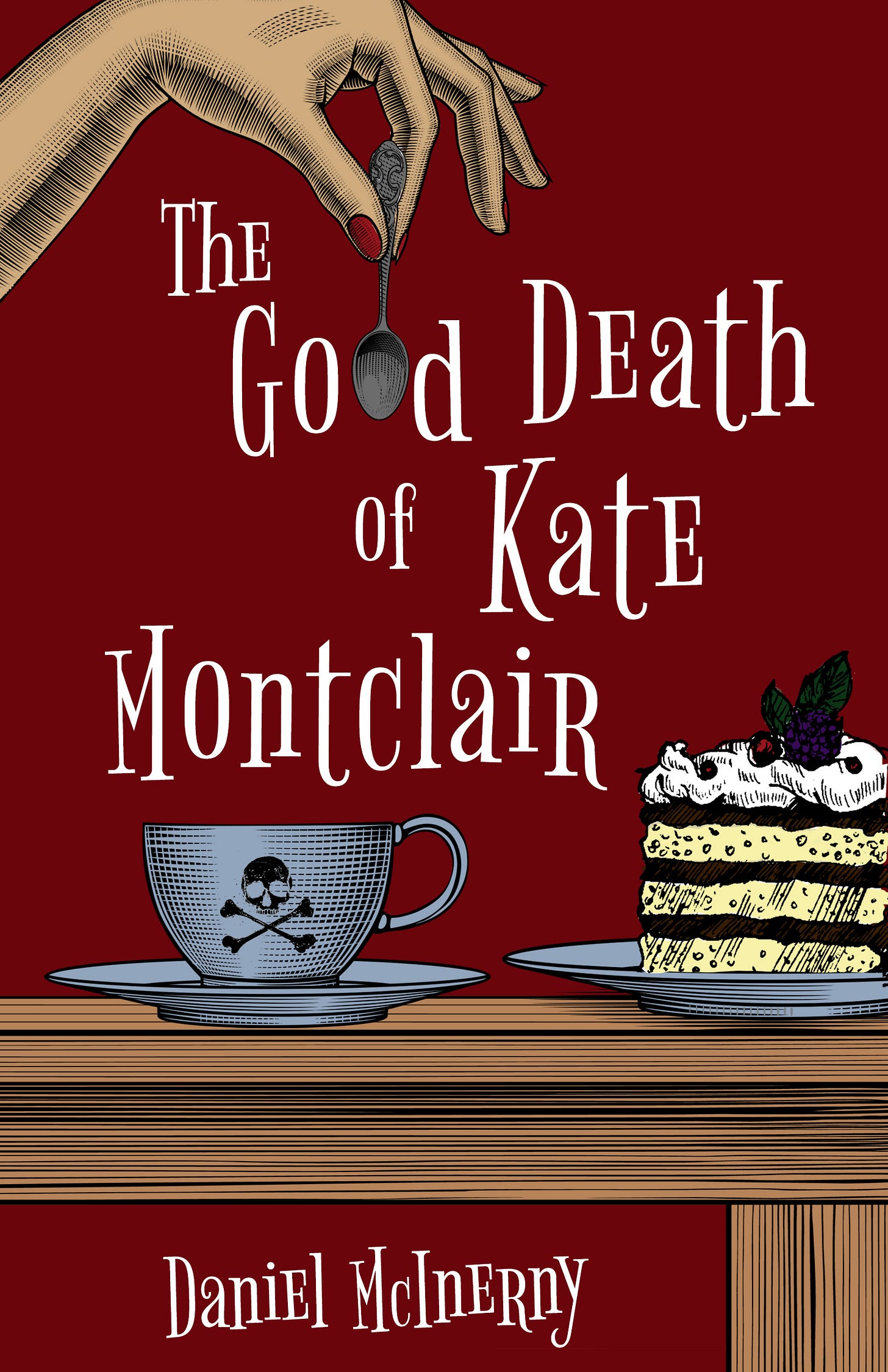Oppenheimer is a Dramatic Failure
Buckle up. I'm just about to criticize the film most everyone is calling a masterpiece.
I am deeply disappointed by Christopher Nolan’s Oppenheimer. I found it long, tedious, and emotionally most unengaging.
As I am about to criticize Oppenheimer rather sharply, I’ll offer my bona fides first.
I admire much, if not all, of Nolan’s work. I think Dunkirk is a true masterpiece, perhaps the best film of the century so far. Inception is grand, too, Interstellar underrated, and the Batman trilogy as good as superhero thrillers get.
What I appreciate most in Nolan is his ambition to marry big popular cinematic vehicles with big, sometimes even philosophical, ideas.
I had eagerly awaited Oppenheimer for over a year. I even saw it with my kids as part of my birthday celebration.
On an IMAX screen.
With popcorn.
So, I was about as primed as I can get for a good time at the movies.
Yet Oppenheimer left me cold. It starts off poorly and just never recovers. It rivals Tenet for being, just simply, spectacularly boring.
It has one or two extraordinary scenes, some very fine acting performances, and striking color grading which gives it a rich period feel. But these parts do not add up to a successful artistic whole. Here is why:
The film does not show us a protagonist with a clear goal encountering clear obstacles to that goal. As Aaron Sorkin likes to say, drama is intention-plus-obstacle. What does Oppenheimer want in this film? Many things, to be sure, but also no clear single thing that unifies his actions and propels the drama. He wants to serve his country; he flirts with Communism; he loves his wife; he cheats on his wife; he wants to build a bomb; he is horrified by, and disassociates himself from, the consequences of building the bomb. Et cetera. Because of this mash-mash of motivations, we never get a clear sense of who Oppenheimer is. We don’t have to like him—which is good, because he is supremely unlikable—but we do need to understand what he is all about. If the point is that Oppenheimer’s motivations are incoherent and that he is an enigma (and I think that is Nolan’s point), then one can only reply that such a character, however true to the historical facts, does not make for compelling drama.
Oppenheimer makes the mistake of most biopics in that it tries to capture the entire adult life of its subject. This is next to impossible to do effectively, even in three hours. And this is part of the reason why we are never clear on Oppenheimer’s goal. It is very difficult to identify for an audience the single goal that motivates a person across that person’s entire life—or entire adult life. The film Oppenheimer certainly fails to do this. For examples of biopics that do not try to capture the subject’s entire life and which succeed admirably in making their subjects dramatically intelligible and engaging, see Sorkin’s screenplays for The Social Network and Steve Jobs (the latter being an especially fine example).
The film contains too many vignettes and not enough scenes. I think because Nolan was determined to get as much of the Bird/Sherwin biography of Oppenheimer, American Prometheus, into his script, he often settled for writing vignettes instead of scenes.
A vignette shows us a character in a situation doing or experiencing something that is perhaps interesting.
A scene shows us a turn, a surprising reversal (however small), in the protagonist’s pursuit of a goal.
The difference between a vignette and scene is not one of length but of the presence or absence of a dramatic reversal. A dramatic reversal is what engages us emotionally. Oppenheimer begins with a barrage of short, quick-cut vignettes. They are somewhat interesting, but because they never quite mature into scenes they are, in the end, dramatically uncompelling.
Example: Oppenheimer’s professor insults him, and Oppenheimer reacts by poisoning the apple on the professor’s desk. What sort of person is Oppenheimer that an insult is enough to motivate him to murder? And why does he ultimately change his mind about the murder and go to destroy the apple before the professor eats it? We never learn. A dramatic reversal is hinted at, but never developed.
Example: Oppenheimer’s wife is shown in several vignettes showing her displeasure with her husband for not fighting against the political players aligned against him. But while we get brief glimpses of her frustration (shouting her displeasure and fleeing the room), her frustration is never shown as the result of a dramatic reversal in a scene involving her husband. This sort of problem permeates the film.
The Lewis Strauss subplot is horribly bloated and not terribly dramatic. It is hard to see how Strauss’s desire to be approved for a cabinet position, even granting that his personal vendetta against Oppenheimer eventually scuttled his approval, is so central to our understanding of Oppenheimer that we need an hour (or more) worth of this subplot. Filming this subplot in black and white does nothing to lend it interest or gravitas. Neither does the fact that Senator John F. Kennedy cast the deciding vote against approving Strauss for the cabinet position. All of which is to say: who cares if Lewis Strauss gets a cabinet position (a cabinet position???) in a film about the making of the atomic bomb? Certainly not I.
There are too many characters. Just too many to make it possible for the audience to care about or find much interest in them all. In writing the script Nolan clearly delighted in getting as much detail as possible from American Prometheus onto the page (sure, it’s fun to see Einstein walking in Princeton with Kurt Gödel), but so much of what he wrote was unnecessary to Oppenheimer’s drama.
Too many scenes of people talking in rooms. There is nothing wrong, in itself, with people talking in rooms. Most scenes in most movies show people talking in rooms. Every scene, save one, in Steve Jobs features two or more people talking in a room (the climactic scene is on top of a parking garage). So why does Oppenheimer fail? Because in the film’s many, many talky scenes (and vignettes) there is too much that is repetitive, unrevealing, and therefore undramatic. All those scenes of Oppenheimer’s hearing in the congressional office building! Why do we need to see so much of that? (And why, for that matter, do we need IMAX cinematography when much of the film is set in the meeting room of a congressional office building only slightly larger than a broom closet? The film gives us almost no sweeping vistas of the New Mexico desert, or any other vista, for that matter. The Trinity Test sequence was very nicely done, but was it exponentially better than the way the Trinity Test is depicted, say, in “The Eternity Ring” episode of Foyle’s War?)
Too many shots of a bug-eyed Oppenheimer tormented by inner demons. Cillian Murphy’s performance as Oppenheimer is very well done, maybe the best that can be done with such an unlikable, incoherent, wooden, emotionally damaged character. But I think I enjoyed the three minutes of Gary Oldman’s cameo as Harry Truman more than any scene that Cillian Murphy was in. Matt Damon, Emily Blunt, David Krumholtz, Tom Conti, and Kenneth Branagh were also excellent.
The two wildly offensive sex scenes. As I don’t think my moral objections to these scenes will hold much water with Nolan or many fans of this film, I will instead register my artistic objection. For a director to attempt to distract (assault) his audience by explicit showings of his characters’ sexual acts indicates that he didn’t think his characters’ dramatic goals and obstacles were strong enough to hold our interest. And in this he was no doubt right.
Here’s the latest 5-Star Amazon review of The Good Death of Kate Montclair…
“Just finished this one. Wow! A book of redemption in the modern world. The author employs his prodigious talents to interweave the past and present lives of his characters so that the reader is entirely caught up in the web of their stories, waiting for the next revelation. He presents the confusing, messy, sad, happy, frustrating, contradictory events of their lives, particularly Kate’s, which come together in a whirlwind, unputdownable ending that makes redemptive sense. The only criticism I have is that [SPOILER ALERT] Kate dies in the end.”
Pick up your copy today here on Amazon or here at Chrism Press.






This is the most well-crafted movie review I've read in a long time. Please do more (perhaps the other half of so-called "barbenheimer?").
I completely agree. I actually don't understand how this film got an Oscar. It was a fascinating story but the endless background music and ultra quick edits and scene changes just wore me out. My brain likes to take in everything, notice everything, get immersed and this movie just wouldn't let me. For example, one minute he is talking to a woman, next thing they are in bed, next thing she's demanding he read Sanskrit to her. The camera never lingers. There is no silence and most importantly no time to care about any of the characters. The one bright spot for me was Robert Downey Jr.'s performance.